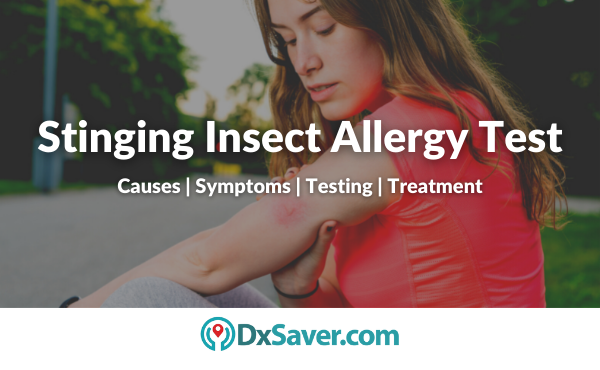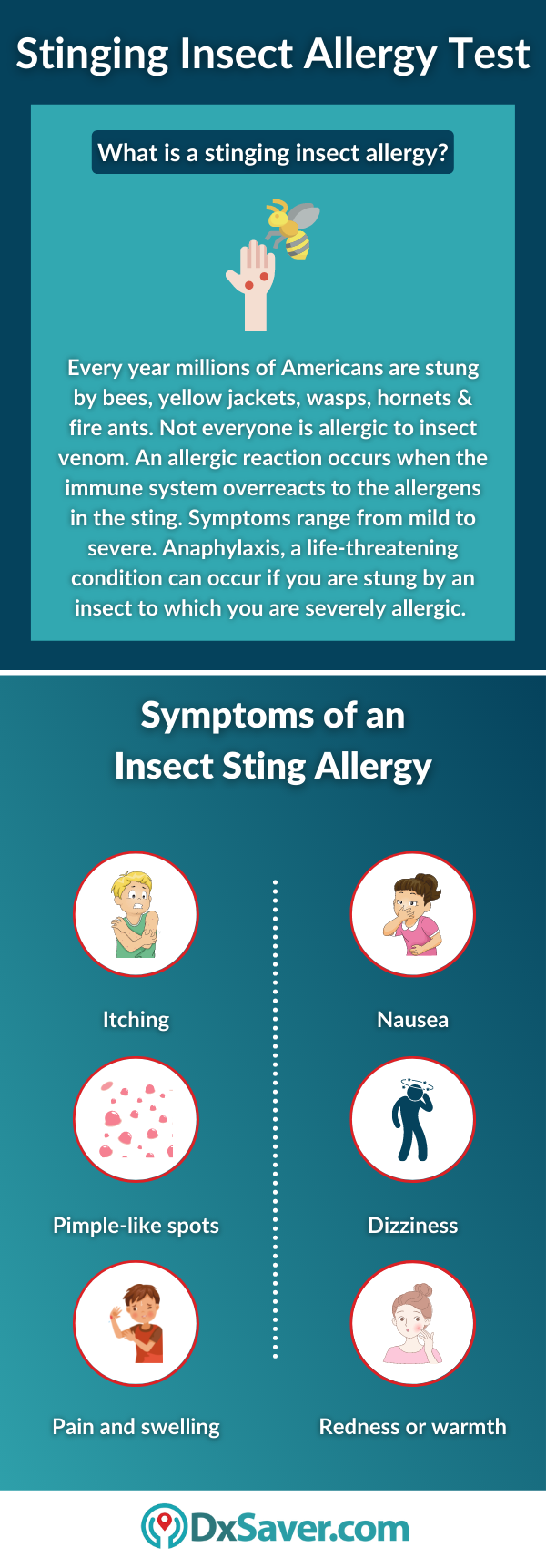
An allergy to insect venom can occur at any time in your life. However, it is more common in men than in women and is more common in adults than in children. Usually, allergic reactions are mild, with local symptoms. It may include a skin rash or hives, itchiness, or swelling. Occasionally, an insect sting can produce a more serious reaction called anaphylaxis. Approximately 2 million Americans have allergies to the venom of stinging bugs. When you are allergic to bee stings, you may also be allergic to wasps, yellow jackets, and hornets. Stinging insect allergy test like skin tests and blood tests are often used together to diagnose insect allergies.
This article covers all the significant topics related to the stinging insect allergy test such as the test cost, causes, symptoms, treatment, and how to get tested for a stinging insect allergy test.
- Stinging insect allergy
- What causes an allergic reaction?
- Symptoms of an insect sting allergy
- Stinging insect allergy test
- Treatment
- Prevention
- Provider locations
For our readers who are interested in knowing the stinging insect allergy test cost beforehand, we begin with that section.
How much does the stinging insect allergy test cost?
Stinging insect allergy test costs range from $118 to $159 in different labs and facilities across the US. Prior appointment isn’t required. You can order tests online by comparing the price or visiting the nearest lab during lab business hours. You will get the results in your email in 2 to 3 business days after completing the procedure. Apart from this, doctor consultation is available for any kind of further treatment or medical advice.
The table below shows the stinging insect allergy test provider and their prices. You can know more and book the test by clicking on the “Book Now” button.
Name of our Partner Labs | Book Online at Offer Price |
HealthLabs
| $159 |
Personal Testing Lab
| $118 |
Stinging insect allergy test cost with insurance
Many insurance companies in the U.S. cover all the vital tests like the stinging insect allergy test. However, the coverage provided by private health insurance companies and national health insurance programs like Medicare varies widely. Most of the health insurance policies cover stinging insect allergy test costs only once or twice a year and when your physician orders more than twice in a year, you should pay the test cost out of pocket. So, you are recommended to check if your health insurance policy covers the stinging insect allergy test cost.
Our stinging insect allergy testing providers do not accept any kind of health insurance policy. However, they can provide you with an itemized receipt containing all the details viz the name of the test, code of the test, and CPT code which is necessary for insurance reimbursement purposes.
Stinging insect allergy
Stinging insects found in the US include honeybees, yellow jackets, hornets, wasps, and fire ants. Not everyone is allergic to insect venom. While some people are allergic to insect stings. In other words, their immune systems overreact to the venom. When people are stung by an insect they develop redness, swelling, and itching at the site. When a person is insect-allergic, their body produces antibodies called Immunoglobulin E (IgE) after the first sting. And if stung again by the same kind of insect, the venom interacts with a specific IgE antibody, triggering the release of substances that cause an allergic reaction.
What causes an allergic reaction?
An allergic reaction occurs when the immune system overreacts to the allergens in the sting. Certain types of stinging insects cause most allergic reactions, it may include:
- Bees
- Fire ants
- Harvester ants
- Wasps
- Hornets
- Yellowjackets
Rarely, bites from insects like bed bugs, kissing bugs, deer flies, and mosquitos may cause anaphylaxis.
Symptoms of an insect sting allergy
An allergic reaction to an insect sting may vary from person to person. Symptoms of an insect sting allergy can range from mild to severe. A mild allergic reaction may cause the following symptoms:
- Pain
- Redness
- Pimple-like spots
- Mild to moderate swelling
- Warmth
- Itching
- Nausea
- Dizziness
- Stomach cramps
- Diarrhea
- Hives over large areas of the body
- Wheezing
Anaphylaxis, a life-threatening condition can occur if you are stung by an insect to which you are severely allergic. These anaphylactic reactions are not common but you’ll need immediate medical treatment, either self-administered or in a healthcare setting. Symptoms may include:
- Restlessness and anxiety
- Trouble swallowing
- Trouble breathing
- Swelling of the face or throat
- Rapid pulse
- A sharp drop in blood pressure

Stinging insect allergy test
Your doctor may do a physical exam and ask about your symptoms and past health. They may suggest one or both of the following tests:
- Skin tests – During this test, your doctor will clean an area of skin on your arm or back with an alcohol wipe. Then they will place extracted venom from the insect in question on the skin and cover it. You may be allergic if reactions like redness, irritation, or swelling occur. When test results are inconclusive, doctors may perform another skin test by placing the insect venom under the top layer of your skin. And when you have a skin test, it is essential to talk to your doctor about any skin conditions you may have.
- Blood tests – During this test, your doctor will take a small sample of your blood. When a person is allergic to the venom in an insect sting, their body is hypersensitive to the venom and produces an antibody in response. And this antibody is a type of immunoglobulin E (IgE) protein. High levels of this protein in the blood indicate an allergy. And your doctor may give you a blood test called a radioallergosorbent test or RAST to determine the amount of particular IgE antibodies in the blood.
Treatment
In case of a severe allergic sting reaction, you will need epinephrine. Epinephrine (adrenaline) can reduce your allergic response. If you ever had allergic reactions to an insect sting, be sure to carry epinephrine with you. Your doctor may also prescribe allergy shots, called immunotherapy, to help prevent worse allergic reactions in the future.
For a local reaction or a mild reaction, you may treat it at home. If stung by a bee, the bee generally leaves a sac of venom and a stinger in the skin. So, make sure to remove the stinger within 30 seconds to avoid receiving more venom. And then gently scrape the sac and stinger out with a stiff-edged object or a fingernail. Do not squeeze the sac or pull on the stinger as more venom will get into you. And you can wash the stung area with soap &water, then apply an antiseptic. Apply a soothing ointment, such as calamine lotion or hydrocortisone cream, and cover the area with a sterile bandage.
If swelling is a problem, apply an ice pack cold compress to reduce swelling. Take an over-the-counter oral antihistamine to ease itching, hives, and swelling. And you may also take an NSAID pain reliever like ibuprofen.
Make sure to follow the warnings on the label. And do not give this medication to children under 2 years old or pregnant women before consulting your doctor. And when you are pregnant, it’s better to talk to your doctor before you take any medicine.
Prevention
If you had an allergic reaction, you have a greater chance of having a similar or more severe reaction if stung again by the same kind of insect. The best way to avoid an allergic reaction is to avoid being stung. But you can’t completely avoid them. Certain tips can help reduce your risk of getting stung, it may include:
- Try to stay away from places where insects nest. (For example, yellow jackets nest in the ground in dirt mounds, old logs, and walls. Whereas honeybees camp out in beehives. And wasps & hornets make their homes in bushes, and trees).
- Wear closed-toe shoes while walking outside.
- Wear long pants, long-sleeved shirts, socks, and shoes when in rural or wooded areas.
- Avoid wearing loose clothing, as it can trap bees between the cloth and your skin.
- Avoid wearing perfume or scented lotions.
- Keep the garbage cans covered and spray garbage cans regularly with insecticide.
- Try to avoid insect-attracting plants and vines growing in and around the home.
- Keep your windows rolled up while driving.
- Be cautious when mowing the lawn or trimming vegetation, activities that might arouse insects in a beehive or wasp nest.
- Remove hives and nests near your home by a professional.
- As insects are attracted by the smell of food, be careful while eating outside.
Consider wearing a medical alert identification bracelet if you have had a serious allergic reaction in the past and carry an epinephrine auto-injection kit.
Provider locations
A stinging insect allergy test can be done at any of our partner’s 4500+ labs located across the US. To know the stinging insect allergy test cost, refer to the first section of the article.
Frequently Asked Questions
Will insurance cover my testing cost?
No, insurance will not be covered in the billing. However, they will provide you with a receipt for insurance reimbursement purposes.
How should I book my appointment?
You can choose the most suitable provider from above and make an appointment by following the instructions mentioned by them.
Can I cancel my lab test order?
Yes, you can cancel your lab test order any time before your testing. A refund will be initiated after deducting the cancellation fee. However, cancellation is at the discretion of the provider.
Do the providers offer result interpretations?
Yes, a few providers may provide doctor consultation who will take you through the results and provide clarification if needed.
How do I receive my report?
To ensure your privacy, the test report will be mailed to you by the provider.
Other topics you may also be interested in:-
- What is Food Sensitivity?
- Nut Allergy: Causes, Symptoms, Risk Factor, Testing and Treatment
- Symptoms of Oat Allergy
- What is Shellfish Allergy Test?
- Lactose Intolerance Test: Types and Symptoms of Lactose Intolerance
- Prolactin Test Cost in the U.S.
- Cost of Stool Culture Test in the U.S.
- What is MMA Fighter Blood Test?
- Cost of Amylase Test in the U.S.
- Importance of Aldosterone to Renin Ratio
- Top 10 Foods/Diet for Weight Loss
- How much does the Lipase Test Cost in the U.S?
- Fibrinogen Test Cost in the U.S.
- C-Peptide Normal Levels, Test Results & Treatment
- What is a Triiodothyronine Test? – Purpose, Procedure, and Test Cost
- Glucose Blood Test: Purpose, Procedure and Test Results
- Symptoms of Gluten Intolerance
- Causes and Symptoms of Zika Virus





